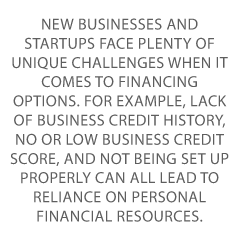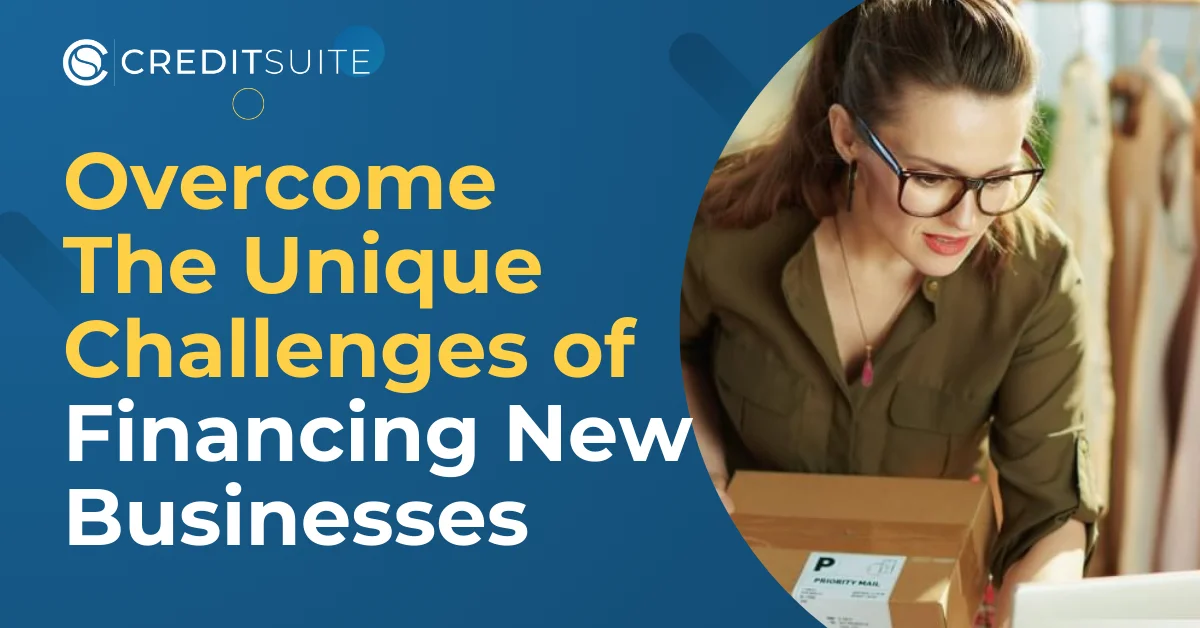 New businesses and startups face plenty of unique challenges when it comes to financing options. For example, lack of business credit history, no or low business credit score, and not being set up properly can all lead to reliance on personal financial resources.
New businesses and startups face plenty of unique challenges when it comes to financing options. For example, lack of business credit history, no or low business credit score, and not being set up properly can all lead to reliance on personal financial resources.
There are financing options that can work despite these challenges however. We have a list of both general and specific resources to ensure you can get the funds you need to start and grow your business.
5 Financing Options to Overcome the Unique Challenges New Businesses and Startups Face
There are a number of possibilities here. Which one will work best for your business depends on your individual circumstances and situation.
#1 Traditional Loans
Of all the financing options most consider when it comes to new businesses and startups, traditional loans are the most common. They can take many forms.
Choices include:
- SBA loans
- Collateral loans
- And loans that require a personal guarantee
Traditional term business loans require a good personal credit score. This is regardless of whether you have business credit history, or even a business credit score at all.
If you have either collateral, a good personal credit score, or both, term loans may be the first and best option for you when it comes to new business funding. That is, unless you want to avoid using your personal credit or collateral. If that is the case, there is another choice which in some instances may be better.
#2 Retirement Plan Financing
Retirement plan financing is not a loan from your retirement plan. As a result, you will not have to pay an early withdrawal fee. You will not have to pay a tax penalty. There will not even be any interest.
The type of financing we are referring to here is a Rollover for Working Capital program. The IRS calls this type of program a Rollover for Business Startups (ROBS).
According to the IRS, a ROBS qualified plan is a separate entity, with its own set of requirements. The plan, through its stock investments, owns the business, not an individual.
#3 Alternative Lenders
If a traditional loan option is not going to work, and you do not have a qualifying retirement plan, it may be time to consider alternative lenders. They often have less stringent requirements than banks and credit unions.
Here are some options to consider.
BlueVine
BlueVine offers both invoice factoring and lines of credit.
For invoice factoring:
- Your business must have been in operation for at least 3+ months
- You need to have a personal credit score of 530 or more
- Your business must generate at least $10,000 in monthly revenue
For the BlueVine line of credit:
- Your business must have been in operation for at least six months
- Be a corporation or LLC
- Have a personal credit score of 600+ or more
- And your business must generate at least $10,000 each month in revenue
Due to regulations, they cannot provide lines of credit to the following states: Nevada, North Dakota, South Dakota, or Vermont.
OnDeck
OnDeck requires a personal credit score of 600 or more to qualify for funding. Also, you must be in business at least one year and have an annual revenue of at least $100,000. They report to the standard business credit bureaus, and they also cannot lend to businesses in Nevada, North Dakota, or South Dakota.
Fundbox
Fundbox requires a minimum time in business of 6 months. In addition, your accounting or invoice software must be compatible and must be in use for at least 3 months. Your credit score must be 600 or above, and you need at least $100,000 in annual revenue.
Other Options
While most alternative lenders, including these, have less stringent credit requirements, many do require a minimum time in business and minimum revenue. If you do not meet these requirements, there are other financing options available.
#4 Credit Line Hybrid
A credit line hybrid is a form of unsecured funding. Our credit line hybrid has an even better interest rate than a secured loan. Not only that, but you can get some of the highest loan amounts and credit lines for businesses, and sometimes with 0% interest!
This is a credit card stacking program, and many of these cards report to business CRAs. That means you can build business credit at the same time. This will get you access to even more cash with no personal guarantee.
You or a guarantor need a FICO of at least 700 to qualify. No financials are required, and you can often get a loan of up to $150,000. Be aware, some cards may report on your personal credit.
#5 Crowdfunding
Crowdfunding sites allow you to tell thousands of micro investors about your business. Anyone who wants to donate, or invest, can do so. They may give $50, they may give $150, or they may give over $500. In contrast, it might just be $5.
Most entrepreneurs offer rewards to investors for their generosity. Usually, this comes in the form of the product the business will be selling. Different levels of giving result in different rewards. For example, a $50 gift may get you product A, and a $150 gift will get you an upgraded version of product A.
Keep in mind that a crowdfunding campaign can easily become another full-time job, and that there are no guarantees of success. We suggest only considering crowdfunding if you realistically believe your chances of succeeding are over 50%.
There are a lot of crowdfunding platforms out there. Here are a few to consider.
Kickstarter
This is the largest crowdfunding platform, and they require a prototype. Projects cannot be for charity, although nonprofits can use Kickstarter. Equity cannot be offered as an incentive.
Taboo projects and perks include anything to do with:
- Contests and raffles
- Cures and medicines
- Credit services
- Live animals
- Alcohol
- Weapons
There is a 5% fee on all funds which creators collect.
Indiegogo
The minimum goal amount for an Indiegogo campaign is $500. There is a 5% platform fee and 3% + 30¢ third-party credit card fee. Fees are deducted from the amount raised, not the goal you set. So, if you raise more than your goal, you will pay more in fees.
A flexible funding option allows campaigns to keep any money they receive even if they do not reach their goal. This is notably different from some other platforms.
RocketHub
RocketHub is specifically for entrepreneurs who want venture capital. The platform is exclusively for business owners working on projects in these categories:
- Art
- Business
- Science
- Social
If you reach your fundraising goal, there will be a 4% fee, and there is a separate 4% credit card handling fee. If you do not reach your goal, the fee increases to 8% plus the credit card handling fee.
Financing Options Are Available for New Businesses & Startups
While it is much harder for new businesses and startups to get funding, there are options out there. Remember, the best way to ensure you have access to the financing options you need in the future is to build a fundable business. That starts now. Contact us today for a free consultation on how to do it.


